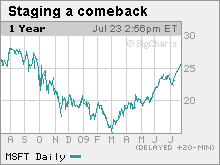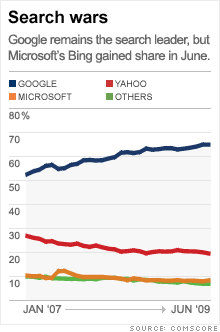Microsoft sales sink another 17%
Software giant's shares tank after revenue slips for a second consecutive quarter and as profit dips 29%.


NEW YORK (CNNMoney.com) -- Microsoft Corp. blamed weakness in the global PC and server markets for a sharp drop in quarterly revenue that badly missed Wall Street's forecasts.
Sales fell 17% to $13.1 billion in the company's fourth quarter ended June 30, far short of analysts' forecasts of $14.4 billion. It was the second consecutive quarter in which sales fell from year-ago levels. In the company's previous quarter, sales fell for the first time in Microsoft's 23-year history as a public company.
"The fourth quarter was one of the most difficult, but in some ways encouraging, in the company's history," said Microsoft Chief Financial Officer Chris Liddell on a conference call with analysts. "We are a stronger company than we were a year ago, but the economy continues to be challenging."
Liddell said he expects a difficult economic environment for the remainder of the calendar year and into the first quarter of 2010, saying Microsoft's sales and earnings would likely face painful year-over-year comparisons for the rest of 2009.
He said the company is optimistic about the effects of a looming economic recovery as well as sales of new products, including Windows 7. But he declined to call a bottom on a difficult sales environment, saying sales of PCs, servers and IT services may have more room to fall.
Shares of Microsoft (MSFT, Fortune 500) fell 8% after hours.
The company's profit also declined, but managed to beat analysts' forecasts.
The Redmond, Wash.-based software giant said its fourth-quarter net income fell 29% to $3.1 billion, or 34 cents per share.
Results included a 2-cents-per-share hit due to $276 million of deferred income from pre-sales of its new Windows 7 operating system, and charges of 2 cents a share on previously announced job cuts and other one-time events.
Excluding the deferral and charges, Microsoft earned 38 cents per share. Analysts polled by Thomson Reuters, who typically exclude one-time items from their estimates, had projected earnings of 36 cents per share.
"There are clearly some long-term issues Microsoft is facing," said David Smith, Microsoft analyst with Gartner. "Though some of it involves the economy and product cycles, the move to lower-cost PCs puts lots of price pressure on the company, as does the continued interest in the Web."
PC sales roil Windows. The company said weak PC sales, especially those sold to businesses, negatively impacted sales of its Windows operating system, which fell 29% in the quarter.
In addition to Windows, deteriorating computer sales have also hurt Microsoft software products like Office.
Microsoft's Vista operating system, which was released in early 2007, never took off like the company had hoped. Sales, along with user satisfaction, have been underwhelming, and IT departments have largely opted to stick with Vista's predecessor, Windows XP.
But preliminary reviews of Microsoft's next operating system, Windows 7, have been largely positive, and the release date was bumped up from early 2010 to October 22. Select users will be able to download Windows 7 in just two weeks.
"Windows 7 puts Microsoft in a very good position to put the problems with Vista behind them," said Smith. "Still, they face pressures with netbooks, and plans to put Windows 7 on netbooks hasn't yet been finalized."
Microsoft isn't alone. Global PC sales have been slumping throughout the recession, sinking 5% just in the past quarter, according to tech consultant Gartner. But Gartner believes PC sales will tick up in the fourth quarter, and Microsoft said it believes computer sales have mostly normalized.
Still, hardware continues to crumble, knocking sales in Microsoft's server unit, off 6% in the latest quarter. Revenue from its entertainment and devices division, which includes the Xbox 360, fell 25% from last year and lost $130 million.
Search battle is on. Microsoft's search market share had been slipping for more than two years. But last month marked the biggest monthly jump in a year for Microsoft, after the company unveiled its Bing search engine in early June. Bing immediately stopped Google's search market growth and ate into Yahoo's.
Despite Bing's initial success, Microsoft still failed to turn a profit in its online advertising business. Microsoft's Online Services division, which includes the online portal MSN and its Internet advertising sales, lost $732 million in the quarter, and sales in the division were down 13% from the same quarter a year earlier.
Still, Google and Yahoo also struggled to sell search advertising this past quarter as well, as advertisers have pulled back in a difficult economy. Analysts widely expect a long-awaited deal to be struck in the coming days between Microsoft and Yahoo (YHOO, Fortune 500) for Yahoo's search advertising business.
Results came as competition grows between Microsoft and its rivals. Google (GOOG, Fortune 500) announced in early July that it will unveil an operating system for netbooks next year -- a market of which Microsoft controls about 90%. Last week, Microsoft announced it would offer a free Web version of its Office suite early next year, which would compete with Google Docs.
Microsoft hopes to make up for any lost revenue by selling ad space on the free version of its hit Office suite. "A comparable set of offerings to Google should go a long way toward people not having to go outside of Microsoft," said Smith. ![]()


